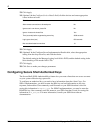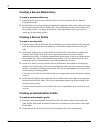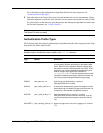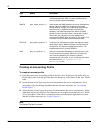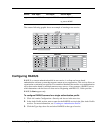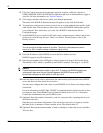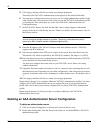
Nokia Network Voyager for IPSO 4.0 Reference Guide 315
For a description of the authentication algorithms that the list items represent, see
“Authentication Profile Types.”
3. Select the item in the Control drop-down list that matches the service requirements. Values
other than required are effective only when the service requires more than one Auth. Profile.
For a description of the effect on result disposition and subsequent algorithm invocation that
the list items represent, see “Profile Controls.”
Note
The Server/File field is unused.
Authentication Profile Types
The following table describes the authentication algorithms that the values represent in the Type
drop-down lists under Auth. Profile.
Note
Modules listed in the Module column reside in the
/usr/lib
directory.
Type Module Description
HTTP pam_httpd_auth.so.1.0 Uses the local password database to authenticate the user,
using a special algorithm specifically for the Apache Web
server. When the user requests a Network Voyager page,
this module is called to authenticate the user, which, in turn,
verifies the user name and password supplied during the
Network Voyager login against the information in
/etc/master.passwd
. Then the module performs Lawful
Interception Gateway processing to determine whether the
user can access the indicated Network Voyager page.
PERMIT pam_permit.so.1.0 Does not do any authentication. It returns a
PAM_SUCCESS when invoked.
RADIUS pam_radius_auth.so.1.0 A client/server authentication system that supports remote
administrator login to Network Voyager and command- line
configuration, and selected management functions.
ROOTOK pam_rootok_auth.so.1.0 Performs one task: If the user id is 0, it returns
PAM_SUCCESS with the sufficient control flag. It can be
used to allow password-free access to some services for
root.
SECURETTY pam_securetty_auth.so.1.0 Allows root logins only if the user is logging in on a secure
TTY.




